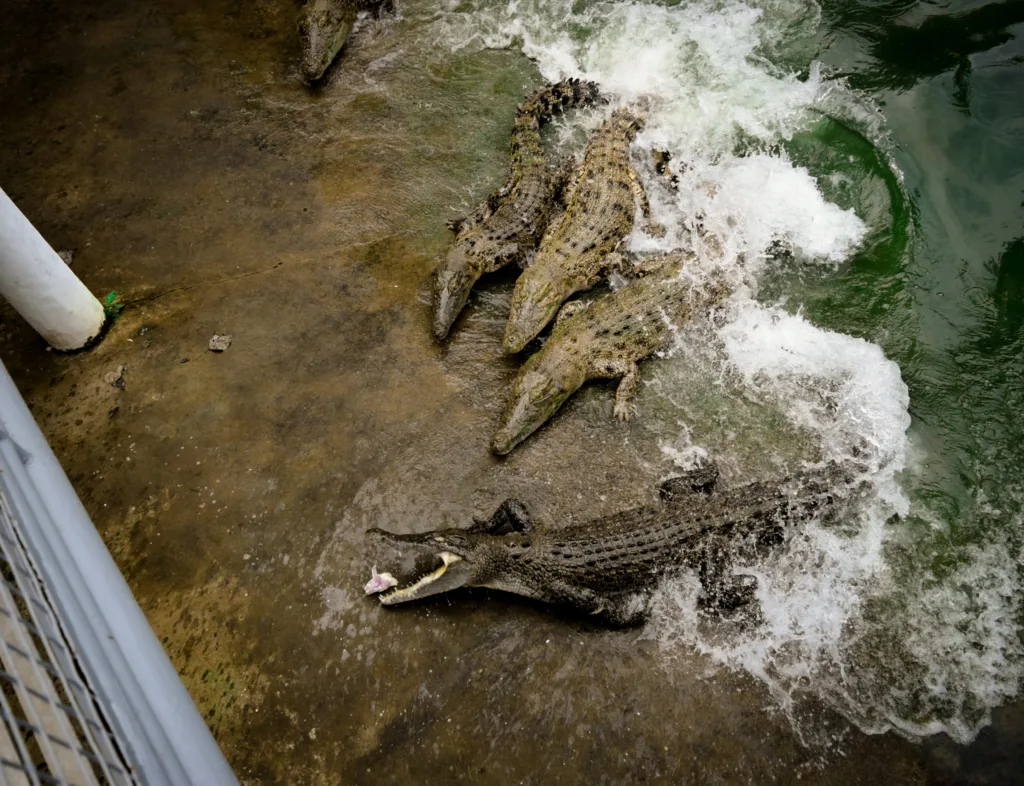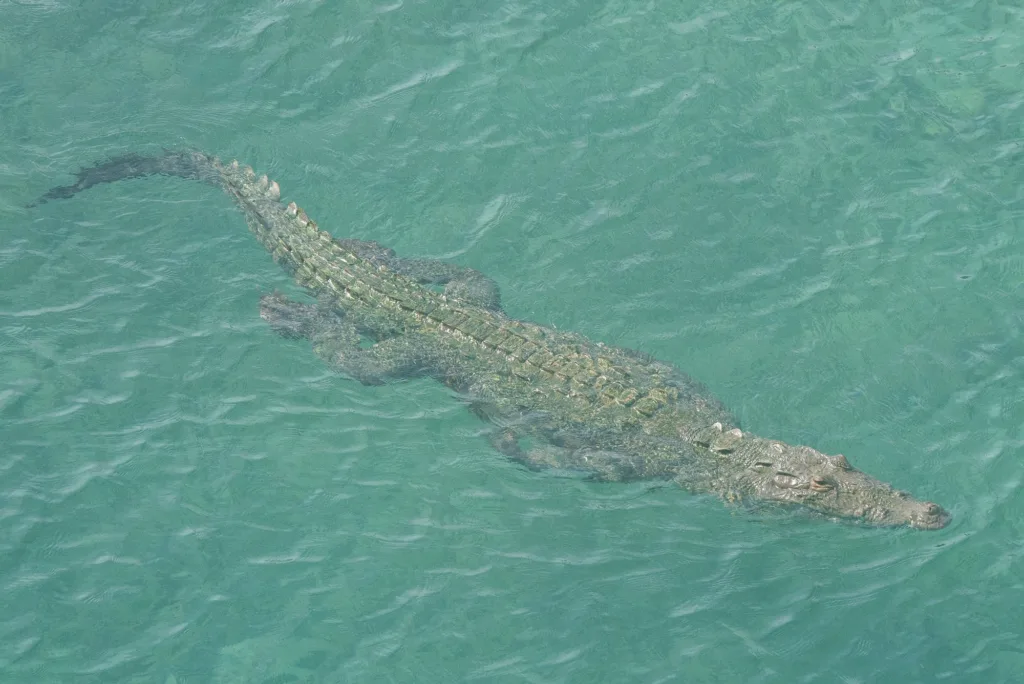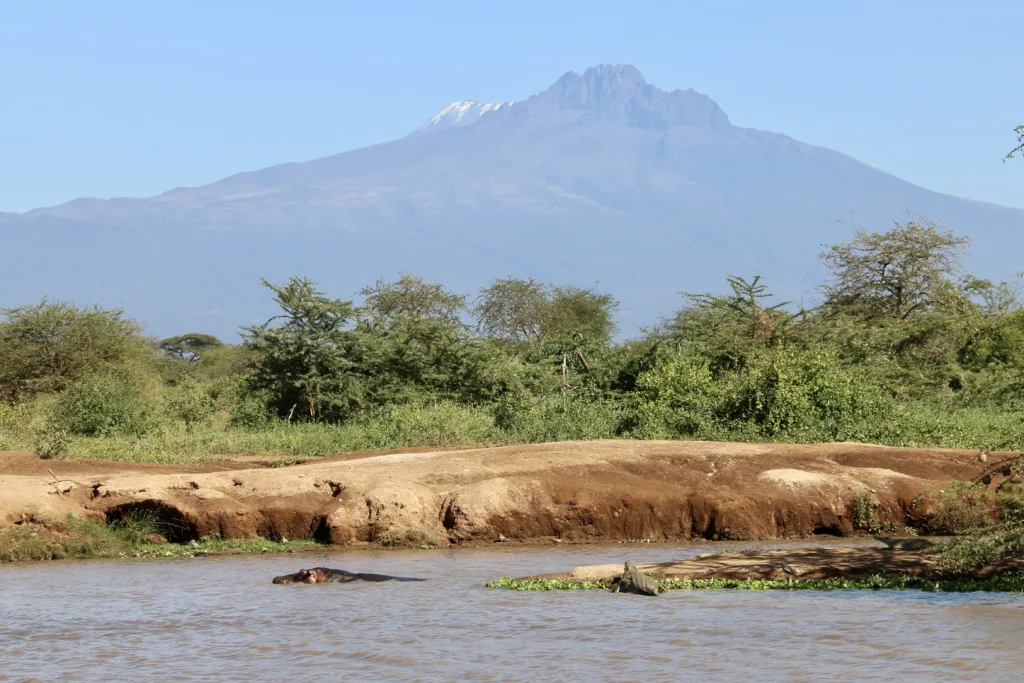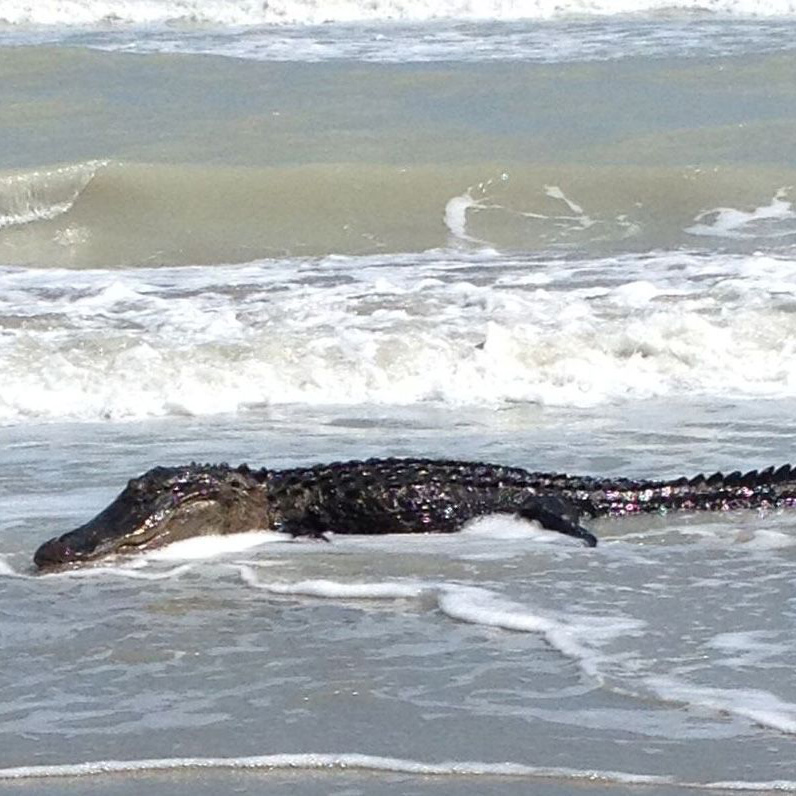Crocodiles are one of the most fascinating creatures on the planet. With their powerful jaws, sharp teeth, and armored skin, these reptiles have been the subject of myths and legends for centuries. But one question that often comes up is whether crocodiles live in the ocean. The answer is not straightforward, but let’s dive deeper into the world of crocodiles to find out.
First, it’s important to understand that there are two main types of crocodiles: freshwater and saltwater. Freshwater crocodiles are found in rivers, lakes, and other freshwater habitats, whle saltwater crocodiles, also known as estuarine crocodiles, are found in brackish and saltwater environments.
Saltwater crocodiles are the largest of all living reptiles, with some individuals reaching lengths of over 20 feet and weighing up to a ton. Despite their massive size, saltwater crocodiles are not well adapted for swimming in the open ocean. They have a poor swimming technique and can easily tire in the open water. However, researchers have found that saltwater crocodiles are able to travel long distances over open oceans by riding ocean currents. This means that while saltwater crocodiles don’t live in the ocean, they do occasionally venture out into it.
Freshwater crocodiles, on the other hand, are strictly freshwater animals and do not live in the ocean. They are smaller and less aggressive than saltwater crocodiles, but still pose a danger to humans and other animals that come too close to their territory.
While crocodiles don’t live in the ocean, they are still able to traverse across it using ocean currents. It’s important to remember that these creatures are wild animals and should be treated with caution and respect. If you’re ever in an area where crocodiles are present, it’s best to stay away from the water’s edge and observe them from a safe distance.
Can Saltwater Crocodiles Survive in the Ocean?
Yes, saltwater crocodiles can go into the ocean. Despite bing poor swimmers, researchers have found that these crocodiles often travel long distances over open oceans by riding ocean currents. This is known as oceanic dispersal and it has been observed in saltwater crocodiles living in Australia and Southeast Asia. These crocodiles are known to travel up to hundreds of kilometers in the ocean, and some have even been discovered on remote islands far from their original habitat. However, it’s important to note that while these crocodiles can survive in saltwater, they still require freshwater for drinking and other essential activities.

Habitat of Ocean Crocodiles
Ocean crocodiles, also known as saltwater crocodiles or “salties,” are found in a wide range of habitats across their range, which includes eastern India, Southeast Asia, and northern Australia. They are known to inhabit both saltwater and freshwater regions, including estuaries, mangrove swamps, rivers, and even some oceanic areas. In Australia, they are found along the northern coastlines, including in the Northern Territory, Western Australia, and Queensland. Salties are highly adaptable and can thrive in a variety of environments, from murky coastal waters to clear inland rivers. They are considered one of the most dangerous animals in the world, and their presence is carefully monitored in areas were they coexist with humans.
Can Alligators Survive in Saltwater Environments?
Alligators are not built to survive in the ocean as they lack salt glands. These glands are essential for removing excess salt from the body, which is necessary for survival in saltwater environments. Alligators can only tolerate small amounts of salt in their bodies and require freshwater to maintain their salt balance. Therefore, alligators cannot survive full-time in the ocean. However, they can move back and forth between marine and freshwater ecosystems to rebalance their salt levels and to feed.
Do Alligators or Crocodiles Live in the Ocean?
No, alligators and crocodiles are primarily freshwater animals and do not live in the ocean. While they may occasionally venture into brackish or saltwater areas, such as estuaries or mangrove swamps, they do not typically live in open ocean habitats. Instead, they inhabit rivers, lakes, and marshes whee they can find ample food and shelter. However, there are several species of crocodiles that are known to inhabit coastal areas and even venture out to sea for short periods of time, but they are not considered true ocean animals. It’s important to always be aware of your surroundings when swimming in any body of water and take necessary precautions to avoid encounters with potentially dangerous wildlife.
Do Crocodiles and Sharks Engage in Conflict?
Crocodiles and sharks are two fearsome predators that have been around for millions of years. While they both prey on other animals, they live in different environments and have different hunting strategies. Crocodiles are freshwater or saltwater reptiles that live close to land and ambush their prey when they come to the water’s edge. Sharks, on the other hand, are fish that live in the ocean and rely on their speed and agility to catch their prey.
While it is possible for crocodiles and sharks to encounter each other in the wild, the chances of a fight between them are relatively low. This is because they live in different environments and have different hunting strategies. Crocodiles are more likely to go after land-based prey such as mammals, reptiles, and birds, while sharks focus on fish and other marine creatures. Additionally, crocodiles tend to stay close to the shore, while sharks roam the open ocean.
However, there have been rare instances where crocodiles and sharks have been observed interacting with each other. In some cases, crocodiles have been known to scavenge on dead sharks that have washed up on the shore. There have also been reports of sharks attacking crocodiles, particularly in areas where they share the same habitat.
Overall, while crocodiles and sharks may come into contact with each other in the wild, it is unlkely that they will engage in a fight. Both are highly skilled predators that have evolved to survive in their respective environments, and they are unlikely to see each other as a potential food source.

Crocodiles in the Ocean in Florida
Yes, there are crocodiles in the ocean in Florida. The American crocodile (Crocodylus acutus) is a coastal species that occurs at the northern end of its range in south Florida. While they prefer brackish or saltwater areas such as ponds, coves, and creeks in mangrove swamps, they can also be found in the ocean waters along the coast. However, they tend to stay close to shore and are not commonly found far out into the open ocean. It is important to exercise caution when swimming or boating in areas where crocodiles are known to live, and to respect their natural habitat.
Do Crocodiles Live in Hawaii?
No, there are no crocodiles in Hawaii. The state of Hawaii is located in the middle of the Pacific Ocean, thousands of miles away from the natural habitat of crocodiles, which is primarily in tropical regions of Africa, Asia, Australia, and the Americas. Hawaii is home to a variety of unique flora and fauna, but crocodiles are not among them. The only reptiles you will find in Hawaii are geckos, which are harmless and commonly found in hotels, homes, businesses, and restaurants. So, if you’re planning a trip to Hawaii, you can rest assured that you won’t encounter any crocodiles dring your stay.
Can I Outrun a Crocodile?
Crocodiles are not known for their speed and agility on land. While they are powerful swimmers and can move quickly in the water, on land they are much slower. Most crocodiles can achieve speeds of around 12 to 14 kilometers per hour for short periods, which is slower than an average human can run. Moreover, crocodiles are not built for endurance and tire quickly, making it easier for humans to outrun them. However, it’s important to remember that crocodiles are dangerous predators and shuld be avoided whenever possible. If you encounter a crocodile, it’s best to back away slowly and seek safety immediately, rather than risking a confrontation.
Are Saltwater Crocodiles Still Alive?
Yes, saltwater crocodiles are still alive and thriving in certain parts of the world. In fact, they are considered to be one of the most successful and adaptable species of crocodile, with populations spanning throughout Southeast Asia, Australia, and parts of the Pacific. Despite being hunted for their valuable hides and being threatened by habitat loss and human encroachment, conservation efforts have helped to stabilize their populations in some areas. It is important to note that saltwater crocodiles are still considered a dangerous animal and caution should always be exercised when in their presence.

Do Crocodiles Venture Far Out To Sea?
Crocodiles, specifically saltwater crocodiles, are known to be excellent swimmers and are capable of traveling long distances by sea. In fact, there have been reports of sightings of these reptiles in the open ocean, far from land. Some sources suggest that saltwater crocodiles can travel as much as 900km by sea. While they may not be particularly strong swimmers, their ability to navigate and survive in marine environments is impressive. Therefore, it is safe to say that crocodiles can go qite far out to sea, and their swimming abilities allow them to explore and inhabit a variety of aquatic environments.
Swimming in Water with Alligators
Swimming in water with alligators is not recommended. It is important to remember that alligators are wild animals and can be dangerous. It is best to avoid swimming in areas where alligators are knwn to inhabit. However, if you must swim in an area where alligators are present, it is important to take precautions. Never swim alone and always be aware of your surroundings. Remember that alligators are attracted to splashing, so try to avoid making sudden movements or creating a lot of noise in the water. If you do spot an alligator while swimming, slowly and calmly make your way back to shore. It is also important to note that swimming at night or during feeding times may increase the likelihood of encountering an alligator. In summary, while it is not recommended to swim in water with alligators, if you choose to do so, it is important to take precautions and be aware of the potential risks.
Fear of Alligators
Alligators are naturally afraid of humans. They have a built-in instinct to retreat quickly when approached by people. This is because they perceive humans as a potential threat and try to avoid any potential confrontation. Additionally, alligators are also afraid of loud noises and sudden movements. They tend to be very cautious and will often flee if they sense danger. It is important to note, however, that while alligators may be afraid of humans, they are still wild animals and should never be approached or provoked.
Predators of Saltwater Crocodiles
There are a few animals that may prey on juvenile saltwater crocodiles, such as monitor lizards, birds, fish, boars, rats, and snakes. However, adult saltwater crocodiles are apex predators, meaning that they are at the top of the food chain and have no natural predators in their ecosystem. Their size, strength, and powerful jaws make them formidable hunters, and they primarily feed on meat, including fish, birds, mammals, and even other reptiles. Therefore, it is rare for any animal to successfully hunt or eat an adult saltwater crocodile.

Do Saltwater Crocodiles Pose a Threat to Humans?
Yes, saltwater crocodiles are known to prey on humans. In fact, they are one of the two species (the other beng Nile crocodiles) with the most well-documented cases of attacking and killing humans. Saltwater crocodiles are highly aggressive and territorial predators that can grow up to 23 feet (7 meters) in length and weigh up to a ton. They are found in Australia, Southeast Asia, and parts of the Indian subcontinent, and are known to inhabit both saltwater and freshwater environments. Attacks on humans usually occur when individuals venture too close to the crocodile’s territory, such as swimming or fishing in rivers or estuaries. It is important to exercise caution and follow safety guidelines when in areas where saltwater crocodiles are known to live, to prevent potential attacks.
The Reasons Behind Alligators Visiting the Ocean
Alligators are known to be adaptable creatures and are capable of living in both freshwater and saltwater environments. While they typically reside in freshwater habitats such as swamps, lakes, and rivers, they are also known to venture into estuaries and coastal areas where the water is brackish and has a higher salt content. This is because these areas provide a diverse range of food sources for the alligators, including fish, crabs, and sea turtles. Additionally, the warmer waters of the ocean can provide a comfortable environment for the alligators to regulate ther body temperature. However, it’s important to note that alligators are not typically found in deep ocean waters, and they are not true ocean-dwelling animals.
Conclusion
In conclusion, crocodiles are fascinating and complex creatures that have adapted to survive in a variety of environments. From the freshwater habitats of alligators to the saltwater territories of the saltwater crocodile, these reptiles have developed unique characteristics to thrive in their surroundings. While often feared by humans, crocodiles play an important role in their ecosystems as apex predators, helping to maintain balance and diversity in their habitats. As research continues to uncover new insights into the behavior and biology of these ancient creatures, we can continue to marvel at their incredible resilience and adaptability.
